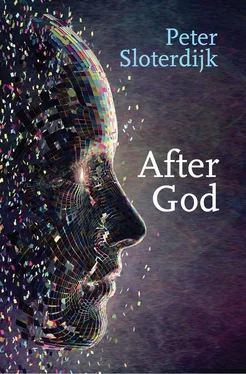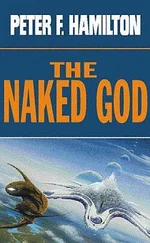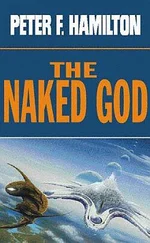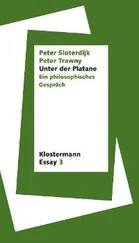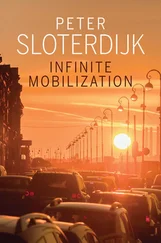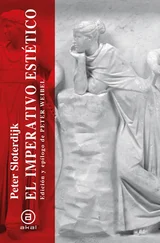If we wish to use terms from philosophy and cultural studies to interpret what is going on with the dynamic of the twilight of the gods, it will be necessary to revise the classic metaphysical image of giving back one’s soul. We need not infringe on the noble idea of the soul’s returning home to a transcendent source. However, it will be essential for us to rethink the figure of the testament or of the “legacy,” from the ground up. In the civilization of modernity, which is animated by creativism and where artificiality is raised to ever higher powers, we can no longer ignore the fact that human intelligence flows out into “works” or artifacts. And this is so even if, today as always, their creators succumb to mortality. (The secondary outflowing of mass culture into trash is another theme.)
In this respect, the necrologist is the key figure when it comes to understanding the process of civilization. When a creative type passes away, the agitated world pauses for a second and meditates on the conveyance of a work in progress 19into the global archive. During this meditative second we are closer to the phenomenon of the twilight of the gods than we would otherwise be.
It was Hegel who, with his concept of “objective spirit,” first took note of the outflowing of intelligence into informed structures with relative stability. His concept was too laden with metaphysical presuppositions to be integrated into the vocabulary of the human sciences without suffering compromises. It was discreetly replaced by the noncommittal term “culture.” Yet, even in the often unbearably vague concept of culture, there is an unmistakable echo of the basic phenomenon: what is invariably at issue is the entrance of living reflexivity into objectivized and materialized structures, whether they be signs, rituals, institutions, or machines. As soon as they stand the test of time, they all take on the quality of a legacy or bequest that no longer presupposes the presence of the living originator. The thanatological significance of books, houses, artworks, administrative bodies, and machines can be seen in the fact that their “functioning” – as readability, as inhabitability, as usability, as sustainability – has become detached from their originators and emancipated for a sort of independent life. The durable artifact often outlives its creator’s lifespan many times over. In time, the light of the legacies, taken together, outshines the idea of a transcendent originator and plunges beings as a whole into the artificial light of civilization. It was with good reason that Gotthard Günther spoke of the “historical frenzy of high cultures.” 20It arises from evolutionary acceleration due to the combined effects of writing, schooling, technology, art, empire building, archives, and askesis.
Historians of ideas have designated the seventeenth century as the key period of burgeoning modernity, because ever since then it has not been just individual, unconnected inventions that have caught sight of the light of the world. This period was epoch-making because it was in this period that invention was invented as the universal method of innovation. The engineer is an invention of the seventeenth century – even if his name already appeared two centuries earlier, at the same time as that of the virtuoso. It was at that time that the evening twilight of God stirred the morning twilight of human creativity. In the following three centuries, this changed the world more starkly than millions of years of natural evolution could have done.
*
In order to understand the present as a time of growing complexities and intricacies, we must gain insight into the proliferation of twilights. At issue now is no longer merely this or that twilight of the gods, which gave mythologists, theologians, and artists pause. If twilights of the gods follow from the very dynamics of cultures of invention, it stands to reason that future twilights won’t stop at the mysteries of the human power of invention either.
Since the early twentieth century we have been able to recognize how an earthly twilight of souls has overlain the metaphysical twilight of the gods. There is a certain consistency here, insofar as God and the soul formed a pair in classical metaphysics. The fading away of one authority cannot be easily conceived without the fading away of the other. The arrival of depth psychologies around 1800, of Viennese psychoanalysis around 1900, and the sublation of both in the neuro-cognitive sciences around the year 2000 are unmistakable signs of this occurrence.
Consistent with this twilight of souls is a concomitant twilight of intelligence. In the course of the latter, numerous accomplishments of the human mind are increasingly transferred to the “second machine” – to use a term that Gotthard Günther coined in 1952 (in a commentary on Isaac Asimov’s novel I, Robot ). In the processual universe of the second machines, the remainder of the old Indo-European concepts of the soul become secularized.
In view of this evidently inexorable event, the question arises, what remains of the eternal light of the soul once the artificial lights have been turned on? What remains of it after the soul has ceded a good part of its former luminosity to the more and more clever artifacts of the world, to computerized objects? The first machine empowered the soul; the second forces it to question itself.
Must we really entertain the suggestion that the inventors of artificial intelligence had thrust themselves into the vacant position of God the maker? But then shouldn’t they have followed God’s lead and banked on the resistance of their creatures? Is there an original sin for machines? Should machines believe in their humans, or will we have an ahumanism of robots?
What should we say to the antimodernist hysteria that has been blazing for centuries, now that it alleges that the human being would like to “become like God”? And if the answer were that, according to basic Christian doctrine, God wanted to become human, should anyone be surprised then that humans’ certainty of their distinguished provenance from a maker leads them to want to become a second machine?
We cannot foresee the consequences of this ever faster emptying out of human reflections into machine reflections. Countermovements make their stand against it. Dams are built to resist the floods of externalized intelligence. To speak in traditionalist terminology: we no longer live merely in the midst of the first analogia entis , between God and human being, but also with the second one, between human being and higher machine. Being is intrinsically constituted as a scale of powers and intelligences. Not a few of the shrewdest among our intellectually virulent contemporaries – here I will name Hawking and Harari, but many more are worth mentioning – express their spiritual worries by envisioning humans as taken over by their digital golems.
Perhaps the distinction between God and idols will soon reemerge here for the citizens of modernity – but this time in a technological and political register. For them, theological enlightenment – which is completely different from an instinctive rejection of religion – will be a fateful task.
For the time being, let me leave the last word to the thinker who reflected on the phenomenon of artificial intelligence earlier and more incisively than all of our contemporaries. At the end of his 1956 essay Seele und Maschine [ Soul and Machine ] (1956), Gotthard Günther writes:
The critics who lament that the machine “robs” us of our soul are mistaken. There is a more intensive interiority that lights up on a deeper level. With a sovereign gesture, this interiority thrusts away its forms of reflection that have become indifferent and reduced to mere mechanisms, in order to affirm itself in a more profound spirituality. And the doctrine of this historical process? However much of its reflection the subject cedes to mechanism, it only becomes richer. For it thereby acquires ever-new powers of reflection from an inexhaustible and bottomless interiority. 21
Читать дальше
